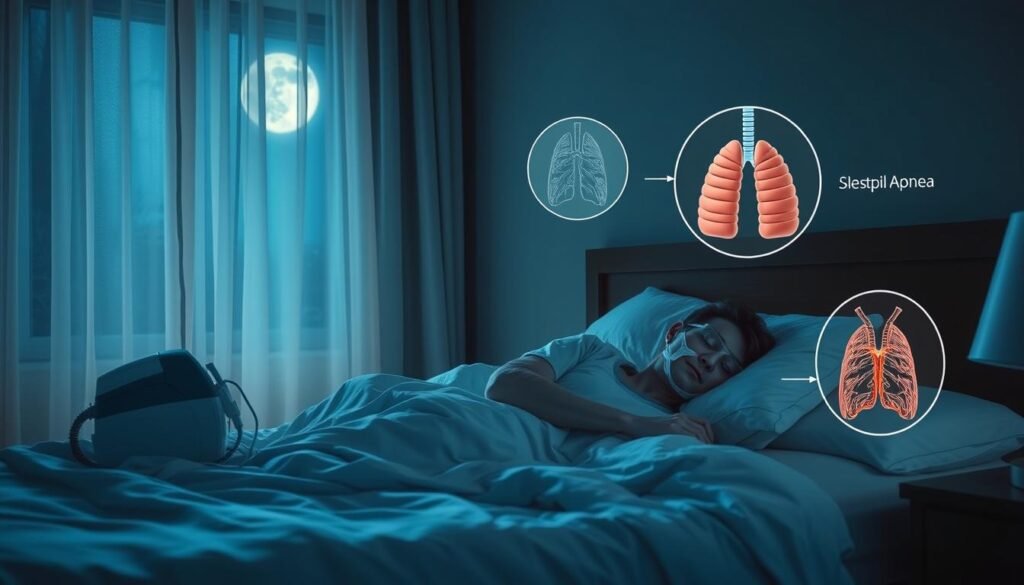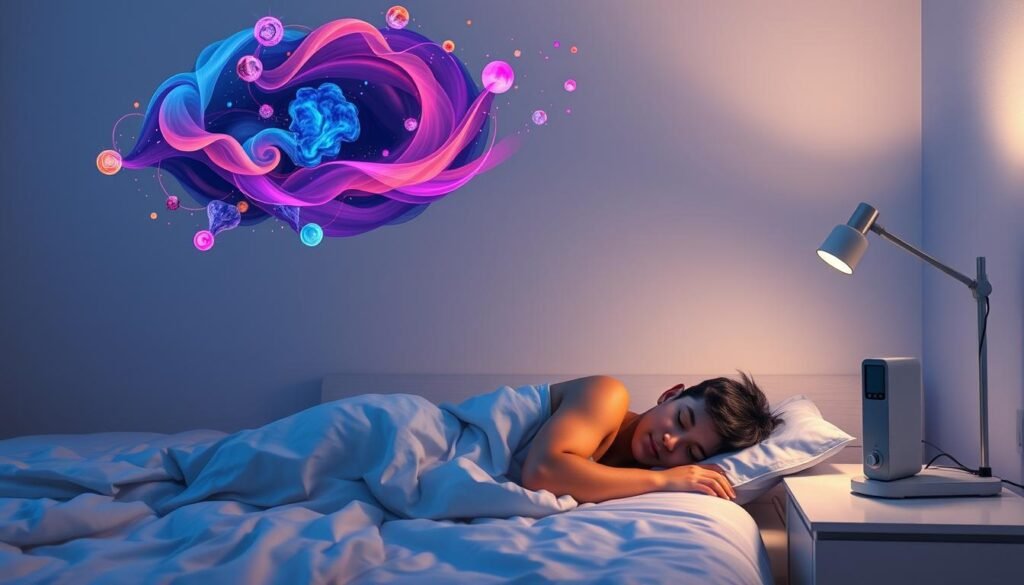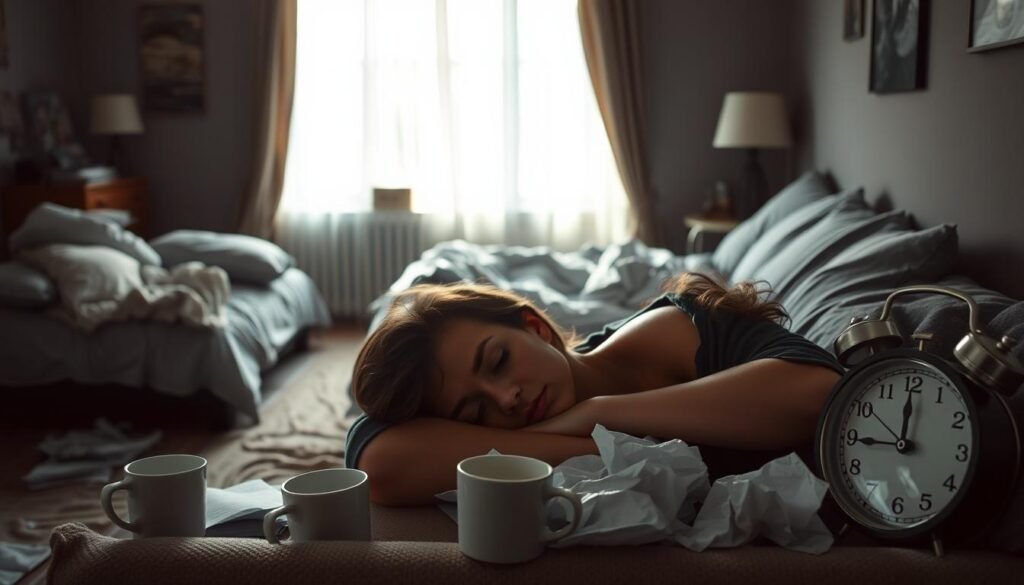About 70 million American adults have chronic sleep problems each year. This is a big issue that many don’t know about. Especially how insomnia and sleep apnea are connected. About 50 to 60 percent of people with one sleep disorder also show symptoms of the other. This makes it hard to get a good night’s sleep.
Understanding the link between insomnia and sleep apnea is key. It’s important for those affected to look for treatment. Not treating these conditions can lead to serious health issues. This includes heart disease and a higher chance of dying early. We will explore how insomnia and sleep apnea affect people. We’ll talk about symptoms, how they are diagnosed, and treatments like CPAP therapy and cognitive behavioral therapy. We’ll also discuss ways to sleep better.
Key Takeaways
- Around 70 million American adults experience chronic sleep problems each year.
- 50 to 60 percent of those with insomnia also have obstructive sleep apnea.
- Patients with insomnia and sleep apnea face increased health risks, including cardiovascular disease.
- CPAP therapy is a common treatment for sleep apnea that helps improve sleep quality.
- Cognitive behavioral therapy can effectively address insomnia symptoms.
- Establishing a consistent bedtime routine and practicing good sleep hygiene is essential for better rest.
- Undiagnosed sleep disorders can exacerbate other health issues, emphasizing the importance of seeking treatment.
Understanding Sleep Disorders
Sleep disorders are conditions that affect our sleep regularly. Over 70 million people in the U.S. face these issues. They can mess up our daily lives and hurt both our physical and mental health. Insomnia is the most common problem. Obstructive sleep apnea is also dangerous for many. It’s important to know about these to manage them better.
Overview of Common Sleep Disorders
There are over 80 different sleep disorders. They have their own symptoms and causes. Some key sleep disorders are:
- Insomnia: It’s hard to fall or stay asleep, causing tiredness during the day.
- Obstructive Sleep Apnea: Breathing stops and starts in sleep, coupled with loud snoring.
- Narcolepsy: It causes sudden sleepiness and sleep attacks during the day.
- Restless Legs Syndrome: There’s a need to move the legs because they feel uncomfortable, especially at night.
- Nightmares and Night Terrors: These are bad dreams and terrors at different sleep times, affecting all ages.
Many things can cause sleep disorders. These include drinking coffee or alcohol and changing sleep times, like with shift work. Also, heart disease or diabetes can affect sleep. If you have these problems, it’s good to get help. The Mayo Clinic is a great place for advice and treatment.
Impact of Sleep Disorders on Health
Not sleeping enough can seriously affect our health. It can lead to heart disease, high blood pressure, and even stroke. It can also mess with how we think, make us moody, and lower our life quality.
The first step to tackle sleep disorders is to know the signs. These include not being able to sleep, waking up often, feeling sleepy during the day, and loud snoring. Doctors use medical history, sleep tests, and exams to find out what’s wrong. Then, they decide how to help best.
| Sleep Disorder | Common Symptoms | Potential Risks |
|---|---|---|
| Insomnia | Difficulty falling asleep, daytime sleepiness | Depression, anxiety, decreased productivity |
| Obstructive Sleep Apnea | Loud snoring, gasping for air | Hypertension, heart attack, stroke |
| Narcolepsy | Excessive daytime sleepiness | Compromised safety, impaired cognitive function |
| Restless Legs Syndrome | Uncomfortable leg sensations, urge to move legs | Sleep disruption, fatigue |
It’s vital to manage sleep disorders correctly. Treatments might include changes in lifestyle, therapy, or even medication. Taking care of sleep problems is key for better health and happiness.
What is Insomnia?
Insomnia is a common sleep disorder that makes it hard for someone to fall or stay asleep. People with insomnia often find themselves waking up at night and have trouble sleeping again. There are two main types: acute insomnia and chronic insomnia.
Types of Insomnia: Acute vs Chronic
Acute insomnia is short-term, lasting less than three months, often caused by stress. Chronic insomnia lasts more than three months and might be due to ongoing problems like mental health issues. About 1 in 3 people suffer from chronic insomnia, impacting their daily lives significantly.
Causes of Insomnia
Many factors can lead to insomnia, such as stress, irregular sleep habits, and diseases like anxiety or depression. Too much caffeine and bad sleep habits also contribute. People with sleep apnea, affecting 25–30% of men and 9–17% of women, are more likely to have insomnia.
Symptoms of Insomnia
Insomnia can deeply affect someone’s life. Symptoms include:
- Lying awake for long times
- Waking up often during the night
- Not feeling rested after sleep
- Feeling sleepy or tired during the day
- Having trouble with focus and memory
Insomnia symptoms are 40–60% more common in those with sleep apnea. Understanding insomnia’s complex nature is key to treating it. Especially if sleep apnea is also a problem. For detailed info on these sleep issues, check out resources like the connection between sleep apnea and insomnia.
What is Sleep Apnea?
Sleep apnea is a severe sleep disorder. It happens when your breathing stops or becomes very shallow while you sleep. Obstructive sleep apnea (OSA) is the most common form. In OSA, throat muscles relax and block your airway off and on during sleep. This condition affects millions and can lead to health problems and disrupted sleep.
Overview of Obstructive Sleep Apnea
Obstructive sleep apnea can happen to anyone, but some are at higher risk. Men are more likely to have it than women, about 2 to 3 times more. Smokers face a three times greater risk than non-smokers. During sleep, someone with OSA might stop breathing for short times. This can happen 5 to over 30 times an hour, harming their sleep.
How Sleep Apnea Affects Sleep Quality
Sleep apnea greatly lowers sleep quality. Breathing stops often make sleep choppy, causing tiredness and drowsiness in the day. This drowsiness increases the chances of accidents at work and on the road. Moreover, sleep apnea can lead to severe health issues. These include high blood pressure, heart problems, and higher diabetes risk.
Sleep Apnea Symptoms
It’s important to know the signs of sleep apnea to get sleep apnea treatment. Key symptoms are:
- Loud snoring
- Gasping for air during sleep
- Persistent fatigue and daytime drowsiness
- Irritability and mood changes
- Difficulty concentrating
Partners often report losing sleep due to the loud snoring. Noticing these signs early can help with getting treatment in time. This improves life quality for those affected.

Connection Between Insomnia and Sleep Apnea
The link between insomnia and obstructive sleep apnea is not simple. It creates tough situations for those who suffer from it. Having both conditions at the same time, known as COMISA, makes it hard to figure out the right treatment. Studies show that 30-50% of obstructive sleep apnea patients also have chronic insomnia. Meanwhile, 30-40% with insomnia end up being diagnosed with obstructive sleep apnea.
Comorbid Insomnia and Obstructive Sleep Apnea (COMISA)
People with COMISA face a lot of discomfort. Their pain is 20 points higher than those who have just one of the conditions. Research also highlights a 47-56% higher risk of dying from any cause among these patients. Symptoms become worse because sleep apnea causes many awakenings during the night.
How Sleep Apnea Can Lead to Insomnia
About 30% of people with sleep apnea find it really hard to stay asleep. This is called a ‘low arousal threshold.’ It means they wake up often, which can start episodes of insomnia. This situation gets worse as insomnia can increase stress. This stress can make sleep apnea symptoms more severe. Also, people with insomnia struggle to use CPAP machines. CPAP therapy is very important for managing sleep apnea. Therefore, this becomes a big hurdle.

Symptoms of Insomnia with Sleep Apnea
People with insomnia and sleep apnea face tough symptoms that really affect their lives. They feel very sleepy and irritated during the day. Their sleep doesn’t go smoothly, making them tired and grumpy.
This tiredness can mess with their mood and how they get along with others. Being more irritable can make it hard to be happy in life.
Daytime Sleepiness and Irritability
Dealing with lack of sleep makes people very sleepy when they should be awake. They have less energy and get less done. They might also feel too tired to do normal activities.
This sleepiness can make it dangerous to drive, raising the chance of accidents. People might find it tough to stay awake and take part in daily life.
Cognitive Decline and Impaired Focus
Not sleeping enough can make it hard to think clearly. People may have trouble remembering things and focusing. These symptoms are common when someone has both insomnia and sleep apnea.
This situation is tricky because figuring out the main problem is hard. It requires careful checks and treatment.

Diagnosis of Insomnia and Sleep Apnea
Doctors start by reviewing a patient’s medical history and their sleep habits to diagnose insomnia and sleep apnea. Getting the diagnosis right is key to treating and improving sleep quality. They use tools for diagnosing sleep disorders to find what’s causing the sleep issues.
Tools for Diagnosing Sleep Disorders
There are different ways to diagnose sleep problems, such as:
- Clinical assessments: Doctors talk about symptoms and sleep patterns.
- Sleep diaries: Patients track their sleep over several weeks.
- Polysomnography: This test measures brain activity, breath, and oxygen levels during sleep.
- Home sleep apnea testing: Some can take simpler tests at home.
The Importance of Sleep Studies
Sleep studies help doctors understand sleep disorders better. They provide important info for choosing the right treatment. Studies show that insomnia and sleep apnea often occur together, affecting 18% to 42% of people. These conditions make treating patients more complex.
For example, having both can increase the risk of heart and mental health issues, according to recent research found here. Adding behavior analysis for insomnia to the diagnosis helps doctors make tailored treatment plans. Recognizing these patterns is crucial for health, as sleep studies show.
Treatment Options for Insomnia with Sleep Apnea
To treat insomnia and sleep apnea together, a mixed approach is needed. This approach involves therapy, medications, and better sleep habits. Together, these methods improve sleep and mental well-being.
CPAP Therapy for Sleep Apnea
CPAP therapy is a top treatment for sleep apnea. It uses a machine to help keep airways open while you sleep. With regular use, it can greatly reduce sleep apnea symptoms and enhance sleep quality.
Many report feeling more alert during the day and better overall mood after starting CPAP.
Cognitive Behavioral Therapy for Insomnia
Cognitive behavioral therapy (CBT) is great for treating insomnia. It tackles the negative thoughts and actions that mess with sleep. Usually, six to eight CBT sessions can help create better sleep patterns.
This therapy is often as effective as sleep meds but safer, making it a preferred choice for long-term insomnia. For tips on handling anxiety from sleep issues, see this resource.
Improving Sleep Hygiene
Sleep hygiene is key for dealing with insomnia and sleep apnea. A stable sleep schedule, a soothing bedtime routine, and an ideal sleep setting boost sleep quality.
Making your bedroom dark and cool, reducing screen time before bed, and avoiding big meals before sleep can all help.
Preventive Measures and Lifestyle Adjustments
Putting in place effective measures can really boost sleep for those with insomnia and sleep apnea. Changing your lifestyle is key in handling symptoms and fostering healthier sleep. Keeping a regular sleep schedule is crucial.
Consistency in Sleep Schedule
Keeping a strict sleep-wake cycle helps your body’s clock stay in rhythm. Sleeping and waking up at the same times every day is important. This routine lessens sleep apnea issues and boosts health. Studies show a regular sleep schedule is vital for managing obstructive sleep apnea.
Creating a Relaxing Bedtime Routine
Starting a calming routine at night tells your body it’s time to sleep. Doing calm activities like reading, meditation, or gentle yoga helps you drift off. These stress-reducing habits make for better sleep. Avoiding heavy food, caffeine, and alcohol at night is also important, as they can affect sleep.
For more tips on self-care for sleep apnea, see this detailed guide. Adopting these changes can greatly improve sleep and health. A dependable sleep routine and relaxing pre-sleep activities are key to restful nights. By focusing on better sleep routines, people can enjoy improved rest and well-being.
Conclusion
Insomnia and sleep apnea make it hard to get good sleep and stay healthy. Research shows that up to 58% of people with obstructive sleep apnea (OSA) also have insomnia. This makes treatment harder but also shows why it’s crucial to tackle both issues together.
Knowing what causes these sleep problems helps people find the right help. Using cognitive behavioral therapy with other OSA treatments works better than one method alone. This way, people can really improve their sleep and how they feel each day.
It’s very important to get advice from health experts for dealing with insomnia and sleep apnea. Getting the right diagnosis and treatment helps people lead happier, healthier lives without sleep troubles.